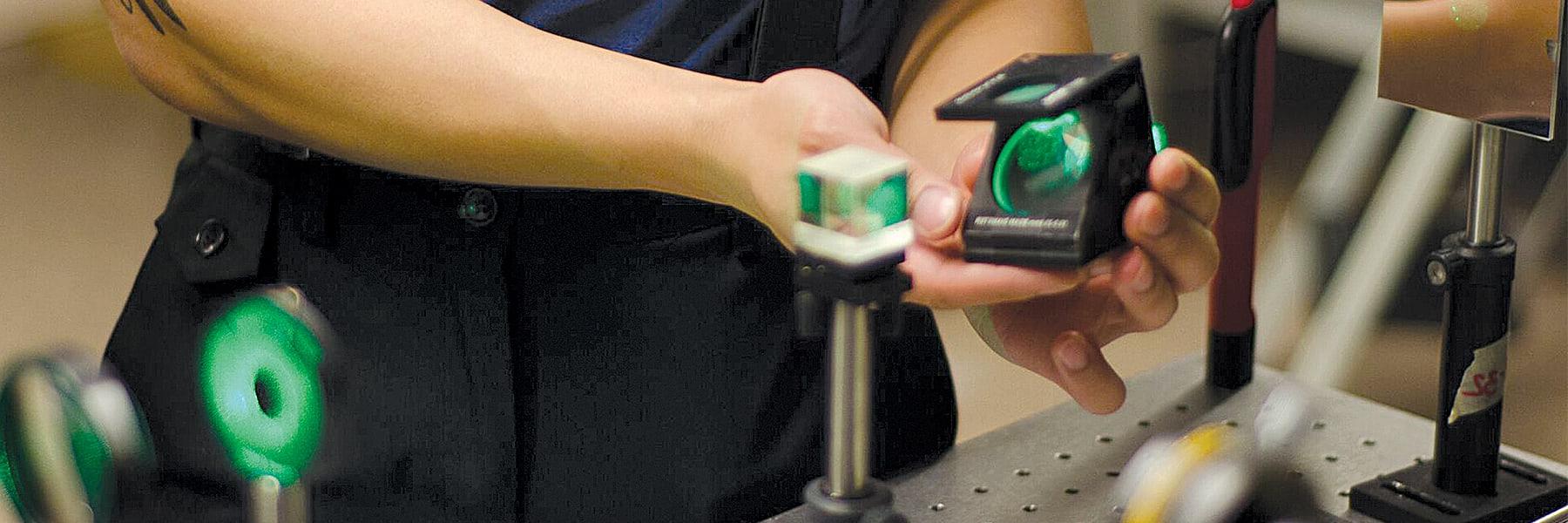Plan Your Education
How to Apply
Students who enroll in the Applied Physics MS program may, upon completion of MS degree requirements, potentially transition to the PhD program upon successful completion of PhD qualifying exams. External applicants who already hold an equivalent MS degree and are interested in applying directly to the PhD program are encouraged to contact the program.
Deadlines & Cost
All students must apply to the Applied Physics MS program, even if they already have a master's degree. Students who already hold a master's degree may receive transfer credits for some of their previous coursework.
Curriculum
Course Requirements
Core Courses (16 Credits)
Complete the courses below if not already taken as part of the MS degree.
Courses may be waived if the student passes the corresponding examination section prior to enrolling in the course.
- PHYSIC 611 - Theory of Classical Mechanics and Fluid Mechanics 4 Credit(s)
- PHYSIC 612 - Electromagnetic Theory 4 Credit(s)
- PHYSIC 613 - Quantum Mechanics, Atomic, and Molecular Physics 4 Credit(s)
- PHYSIC 614 - Thermodynamics and Statistical Mechanics 4 Credit(s)
Electives (32 Credits)
Complete eight from below.
Courses already completed for the MS may be applied toward this requirement.
- PHYSIC 600 - Electronic Instrumentation I: Analog 4 Credit(s)
- PHYSIC 601 - Electronic Instrumentation II: Digital 4 Credit(s)
- PHYSIC 602 - Laser Optics Laboratory 4 Credit(s)
- PHYSIC 607 - Experiments in Squishy Physics 4 Credit(s)
- PHYSIC 610 - Topics in Medical Imaging 4 Credit(s)
- PHYSIC 616 - Mathematical Methods for Physicists 4 Credit(s)
- PHYSIC 623 - Quantum Mechanics: Scattering and Many-Body Physics 4 Credit(s)
- PHYSIC 632 - Advanced Laser Optics (with Lab) 4 Credit(s)
- PHYSIC 635 - Physics on the Back of an Envelope (Estimation in Physics) 4 Credit(s)
- PHYSIC 638 - Quantum Measurement Theory 4 Credit(s)
- PHYSIC 645 - Cancer Biophysics 4 Credit(s)
- PHYSIC 662 - Computational Science 4 Credit(s)
- PHYSIC 680 - Readings in Physics 3-6 Credit(s)
- PHYSIC 690 - Projects in Physics 3-6 Credit(s)
- PHYSIC 697 - Special Topics in Applied Physics 1-8 Credit(s)
Dissertation (24 Credits)
- PHYSIC 899 - Doctoral Dissertation Research 1-15 Credit(s)
For more information on curriculum, including course descriptions and degree requirements, visit the Academic Catalog.
Graduation Criteria
Complete 72 credits from 18 courses, including four core courses, eight electives, and 24 credits of dissertation courses.
Doctoral candidacy: Completion of the foundational and lab courses of the MS program and passage of written comprehensive examinations and an oral candidacy examination.
Dissertation: Compose and defend a dissertation based on independent experimental or theoretical research. For students who have already published at least one peer reviewed article in a high impact journal, their published work may be used in place of a dissertation at the discretion of the committee and graduate program director, though an oral defense is still required.
Statute of limitations: Eight years.
Contact
Graduate Program Director Chandra Yelleswarapu
chandra.yelleswarapu [at] yutb.net
(617) 287-6063
Administrative Manager Moriah Roache
moriah.roache [at] yutb.net
(617) 287-6092

Department of Physics
Learn more about UMass Boston's Physics department, our research, and our faculty.
Explore the Department of Physics
College of Science & Mathematics
Learn more about the faculty, research, and programs that make up our College of Science and Mathematics.
Explore Now
